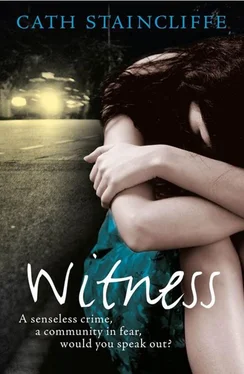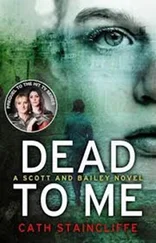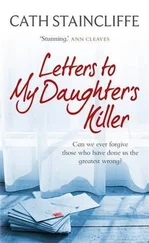The lane led through an avenue of trees, the canopies in full leaf, the track beneath still muddy in the shadiest places from last week’s rains. Fiona hoped she wouldn’t run into any of the regulars, the dog walkers who’d come to know each other through their animals. A rag-tag community, all shapes and sizes. She didn’t want to talk to anyone. She tried to immerse herself in the natural world around her: the heady perfume of dog-roses, splashed pink among the hedgerows, the clamour of sparrows, a small tortoiseshell butterfly dancing in the nettles, the flash of orange and the blue edging far fancier than its name suggested. They crossed into the little wood by the nature reserve building and she saw a wren busy in the undergrowth and a ball of gnats in a roiling jig under the boughs of the trees. The path led on to the water park. The lake was the colour of blue-black ink, ruffled despite the still of the evening. The motorway ran at the other side, its roar ever-present. Pylons stood sentinel, their wires stretched high above the water. Bulrushes and Himalayan balsam, with its sweet, waxy scent, lined the banks. The lake was used for sailing and canoeing but the water was clear of craft now, the boats locked away in the yard on the far side near the fancy motorway footbridge with its triangular frame. Now only ducks and Canada geese, gulls and a solitary heron broke the water’s surface.
Ziggy ran down to the shore and barked half-heartedly at a clutch of geese. The birds ignored the dog. They were resident here all year; their marbled olive-green and white guano decorated the banks and the paths. Further along Fiona saw fishermen, hunkering down for the night, with their green tents and paraphernalia, rods already baited and propped on stays.
Fiona and Ziggy passed a man and a woman with a golden retriever. Strangers: smiles and nods exchanged. When the path left the lakeside, she took the turn up to the river. The banks had been raised for flood defences, and the broken bricks and chunks of concrete peeked through the grass here and there. A path ran along the top and another had been carved out halfway down. Fiona took the lower route, which was punctuated by heaps of debris – kindling and plastic waste – left by the storms. As they neared the bridge again, she was tiring. She stopped and stared into the river, following the ripple where some obstacle altered the current. Ziggy ran ahead then back, waited unsettled, head cocked on one side. They turned for home. The air was cooling now, the sun lost behind the tiled roofs, the swifts still in flight. She had read that they sleep in flight, roosting high above the ground, unable to fly again if they are forced to land. Ziggy waited for her at the back gate. Fiona looked up at the house. Owen was still out. She wasn’t due in work till Wednesday. She must ring in the morning, tell them she hadn’t finished her last visit.
She locked the gate behind them, let the dog in. She took off her trainers and cleared up the dishes even though it was Owen’s job, unable to let them sit and then face another argument about it. She poured a glass of wine.
It was almost nine. She tuned the radio into the local station. Why was she doing this? Proof? Prurience? The jingle came on then the time signal. The newscaster gave her introduction, then announced the headline: Police in Greater Manchester have launched a murder inquiry after a sixteen-year-old boy was shot and killed in the Hulme district of Manchester earlier today. The youth has not yet been named.
‘Danny,’ Fiona whispered, ‘Danny Macateer.’ She turned the radio off and sat in silence until she heard Owen come in at quarter past ten, his footsteps thudding up the stairs, shaking the house. She stood and went up after him. Met him on the landing.
‘Hey,’ she kept her voice light, ‘I said ten.’
He gave a sigh.
‘I love you, you know,’ she said quickly. ‘Don’t ever forget that.’ He made a noise in his throat. She squeezed his shoulder. He swung past her into the bathroom, a half-smile on his lips.
She cleared up the living room, set the alarm, put Ziggy in the kitchen. Routines. Then she went to bed, promising herself that if she couldn’t doze off, she’d get up and read or something. It didn’t matter; she’d no work in the morning. She felt so tired, as though she’d not enough blood in her any more, insubstantial. She closed her eyes. And slept.
Mike
Mike’s first thought was that it was a movie. Someone making a film. The guy stepping out of the Beemer, raising his arm. The retort of the weapon cutting through the traffic noise, through Joe Strummer’s snarling vocals and the thrash of guitars. You saw plenty of filming in the city. Granada Studios were in town. Only a couple of miles or so from here. They used locations for Coronation Street, for other programmes they made. The Town Hall was popular – it doubled as the Houses of Parliament inside – all the marble pillars and stone stairways, elaborate ceilings and mullioned windows. They’d filmed across the way from Mike’s one time. An episode of Cracker, Robbie Coltrane, the big man himself, playing the police shrink, criminal profiler they called it. Coltrane had to knock on this door and when it opened he stepped inside. All morning they’d filmed. Mike had to move his van round the corner out of the way. The little street was chocker with cables and flight cases and the crew. Must have been twenty people milling around. Coltrane did his move again, and again. Up to the door, knocking, stepping inside. Mike grew bored after a while but Vicky was fascinated. She watched from their upstairs bedroom window. Circle seats. Working out what all the crew’s jobs were. Mike left for work. He had to wait for a signal from a guy in a knee-length bubble coat and headset before he could walk down the road to get his van. In case his shadow or his footsteps or something spoiled the shot.
So that was Mike’s first thought: a film. But there was a sick feeling in the pit of his stomach like he knew before he’d even thought it through. No vans or cables, no UNIT signs on the lampposts, no clusters of make-up artists or technicians. No camera.
The lad crossing the grass, he had his back to the man with the gun. Mike wanted to call out, the word rose in his throat. NO! A warning to the lad or a plea to the shooter. The word died on his lips as the lad was jolted, spun a quarter turn then, arms flailing, fell. Lay twitching.
Mike slammed on his brakes, felt the seat belt bite his shoulder, hauled the wheel over to the left and mounted the pavement. Earning a blast on the horn from the car in his wake. He killed the engine and The Clash cut out mid-beat.
Across the far side of the recreation ground the bloke with the gun slid into the passenger seat, pulled the door to and the car set off at speed, the driver gunning the engine. The car was side on and Mike couldn’t see the registration plates. Wouldn’t be able to read them at this distance. There was a woman coming out of one of the houses, dressed in a blue uniform. A nurse. The car almost mowed her down, bucked and swerved past her. She was running to the boy. Mike pulled out his phone and pressed 999 as he jumped down from the van. He walked quickly, closing the distance between himself and the figures on the ground. The lad in his green top and jeans, the nurse crouched over him. Across the way, at the corner of the houses, a dog stood barking up at the roof. At something Mike couldn’t see. Pigeons perhaps, or a cat.
‘Ambulance,’ he snapped when they asked him which service he required.
‘What’s your emergency?’
‘There’s a lad been shot on the field near Abbey Street, in Hulme. Beyond the bridge.’
‘Please stay on the line.’
Читать дальше












